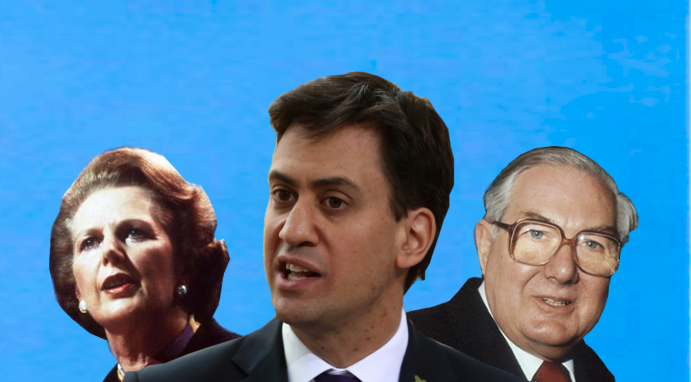The facts from the run-up to the 1979 and 1997 general elections do not justify the optimism that Ed Miliband's position is stronger than it seems
Those who say Ed Miliband’s position is stronger than it seems, tend to draw on two bits of history to make their case. The latest example comes from Mehdi Hasan – formerly of the New Statesman, now with the Huffington Post – on Newsnight on May 15; but he is by no means the first to make the case. I believe they are wrong – and because they are wrong, they are hurting Miliband more than they are helping him by generating a kind of optimism that the facts do not justify.
The argument concerns public attitudes in the run-up to the 1979 and 1997 general elections.
Let’s take 1979 first. Hasan said that Margaret Thatcher trailed Labour’s James Callaghan by 22 points, yet went on to ‘win by a landslide’. I’m not sure that a majority of 43 seats qualifies as a landslide, but leave that aside. Here is what happened.
Want to receive Peter Kellner's commentaries by email? Subscribe here
Six months before the election, in November 1978, Gallup found that Callaghan did indeed enjoy a big lead. 50% said he would make the best Prime Minister; just 26% preferred Thatcher. Had the election been held then, Labour might have won it.
However, the election was not called, and the Government imposed a pay policy that the main trade unions hated. The results was the winter of discontent, with widespread public sector strikes. By February 1979, Thatcher led Callaghan by 41-32%. By huge margins, voters disapproved of the way the Government was handling the economy, cost of living, labour relations and unemployment. The Tories moved into a 20 point lead.
During the election campaign in April, Callaghan moved back into a ten point lead as best Prime Minister. The Conservatives led Labour on jobs and taxation; the two parties were level-pegging on controlling inflation – a huge issue then, with prices rising around 10% a year. Even though the Tory lead shrank (their lead in the popular vote on election day was 7%), the winter of discontent had left its mark. Voters may have liked Callaghan personally, and many remained wary of Thatcher, but most people wanted to kick Labour out. To cite Callaghan’s lead six months before the election is to miss the point about what happened.
Now, 1997. Hasan – and, again, he is not alone – says that the Tories led Labour by 22% on the economy, yet still collapsed to a crashing defeat. This figure comes from a MORI poll conducted on April 8, three weeks before election day.
What MORI did was ask people what issues would be ‘very important to you in helping you decide which party to vote for’. It then asked people which party had the best policy on each of a range of issues.
The top six issues were health, education, crime, jobs, pensions and taxes. Labour was well ahead on four of them, and narrowly ahead on the other two. ‘Managing the economy’ came seventh. On this, the Conservatives had a seven-point lead, 36-29%. Hasan, and others, get their ‘22% lead’ figure from a sub group – not the electorate as a whole, but those who said the economy was a major issue for them. This sub-group, 30% of the total sample, was heavily skewed towards Tory voters. That is why they preferred the Conservatives by 45-23%.
Taking the MORI poll as a whole, Labour was clearly ahead on the issues that mattered most to voters as a whole – and Tony Blair lead John Major by 35-27% when the same people were asked who would make the best Prime Minister. (A Gallup poll conducted at the same time as the MORI survey, put Blair even further ahead, by 41-25%, and showed Labour leading on jobs and taxes.)
What, then, are the lessons for today? Regarding what happened in 1979, we have the dazzling insight that if the current Government presides over a catastrophe of its own making next winter, then the Tories might lose next year’s election.
As for 1997, voters preferred the opposition Labour leader to the incumbent Tory Prime Minister, and felt that Labour would do better on the issues that mattered most. Were that the position today, then Miliband would have good cause for optimism. But it isn’t, and he doesn’t.
Of course, much could change between now and next May. But for the moment, I still reckon it’s a toss-up whether Labour or the Conservatives will be the largest party; the chances of a clear overall majority for either look slim.









